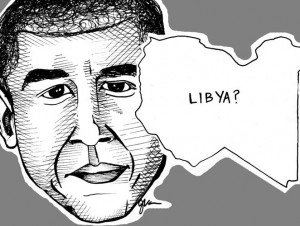Libya is a test of ideology and pragmatism
The ongoing crisis in Libya presents a fascinating foreign policy dilemma for the Obama administration.
President Barack Obama’s victory in the 2008 presidential election was largely spurred by a public that was fed up with George W. Bush’s handling of foreign affairs. Bush, it seems, had squandered the United States’ position as a dominant superpower by wasting our physical and intangible resources on two ongoing and seemingly unwinnable wars.
A problem many Americans had with Bush’s foreign policy was its overly ideological nature.
All policymakers must frequently choose between ideology and pragmatism, and the debate is never more significant than when deciding what is worth sending American troops to fight for.
So many factors enter into that calculation — the number of foreign lives at stake, the chances of success, the geopolitical importance of the region, the consequences of failure — that all presidents must decide how they balance pragmatism with ideology to know when it is “worth it” to wage a military campaign.
In 2008, Obama promised to make American foreign policy more pragmatic. Obama’s victory represented a new era of practicality in Washington as the dogmatic neoconservatives were swept out of office and back to their think tanks.
Obama never pretended to be a Machiavellian realist, however, leaving morality entirely out of the foreign policy agenda. Instead, it seemed he would try to find a better balance between using American power as a force for good — however that is defined — and maintaining and growing that power by avoiding overextension.
This philosophy represents the most judicious use of American power, and it is to be commended.
It has its downsides, however. It leaves the president open to valid criticism from both sides, and it can also lead to “mission creep” as our goals, priorities and limits are not explicitly defined, but rather are context-dependent and continually evolving.
Libyan Colonel Muammar el-Qaddafi’s brutal suppression of the protest-cum-rebel movement in his country has furnished the most difficult test yet for the Obama style of foreign policy.
On one hand, getting involved has little obvious strategic benefit to the United States.
Libya is an oil exporter, but supplies were steady under Colonel Qaddafi and there is no reason to believe helping a rebel movement against him will increase American energy security. A military campaign risks American lives, puts our reputation at risk yet again and costs money that we do not have. Jon Stewart summed up this view best when he quipped that we shouldn’t be firing teachers and tomahawk missiles at the same time.
On the other hand, there is a strong moral argument for getting involved. The Libyan people are now at the mercy of an apparently insane dictator who is willing to bomb civilian targets in his own cities far more urgently and obviously than Iraq in 2003 or Afghanistan in 2001.
Under Bush, getting involved would not have even been a debate. His ideological foreign policy agenda would have embraced the Libyan campaign more than any other, as it represents a perfect maelstrom of dictatorial overreach, genocidal threat and terrorist links.
For Obama, however, the choice is more difficult. He needs to decide how he will balance ideology and pragmatism.
In this context, Obama’s March 18 speech outlining our mission in Libya and reasons for being there was impressive. He clearly explained why the United States had to become involved, why military action was a last resort and what our role will be within an international coalition.
Most importantly, he committed to keeping troops off the ground and keeping the use of force limited to the protection of Libyan civilians.
Since then, however, the military’s actions in Libya have exposed Obama’s conflicting policies. We bombarded targets in various cities and lost a fighter jet. Republicans in Washington seized the opportunity to criticize Obama’s apparent flip-flop and ironically are warning about another Iraq.
That might not be realistic, but the Republicans are right to call out Obama as the United States drifts toward the ideological side of the spectrum. The key to maintaining a balanced foreign policy is articulating a clearly defined line that will not be crossed.
In the past few days, we have crept ever-closer to that line. Hopefully, we will stop before we cross it.
Daniel Charnoff is a senior majoring in international relations (global business). His column, “Through the Static,” runs Fridays.


He led us into war without consulting us. He didn’t even return to US soil before launching an attack on third font. He said he would end foreign wars during the presidential campaign. When will our troops have a rest and come home?
We are already using 40% of our federal budget on interest payments. The first day of attacks used more than $100,000,000 in missiles alone. We don’t have the money for another war. We won’t get that money back from trade with Iraq, Afghanistan or Libya.